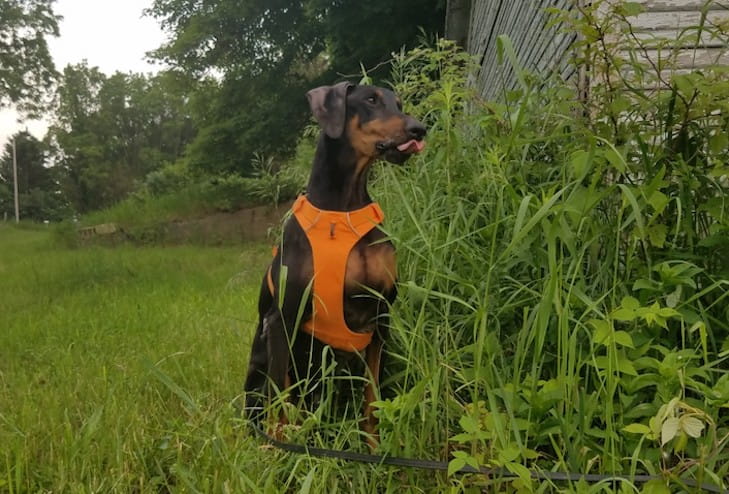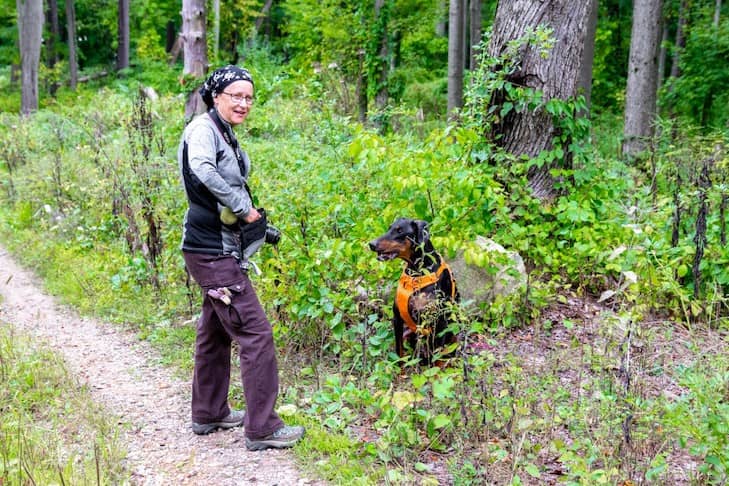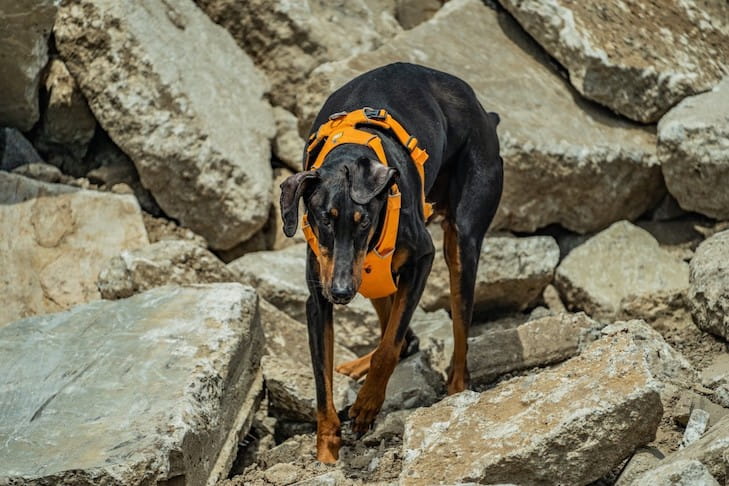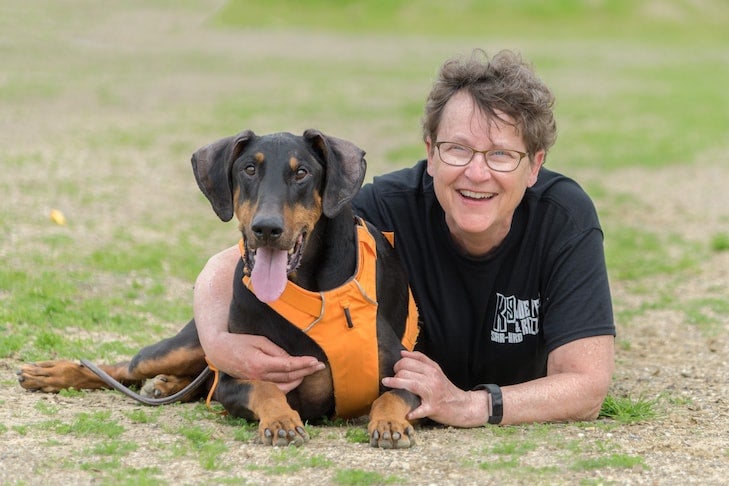
Make no mistake about it, Joe Pete is a stellar search and rescue dog. But the plucky 9-year-old Doberman Pinscher also gives new meaning to the word rescue.
“There is a saying that you get the right dog at the right time,” says owner-handler Cris Bean, of Eaton Rapids, Michigan. “I had always been a busy Mom, raising my children and homeschooling five of the six. When I got Joe Pete, only two teenage sons remained at home. Shortly after my marriage ended, Joe Pete was there to pick up the pieces. This new adventure helped me to set goals of my own. A dear Aunt said to me later, ‘Joe Pete rescued you.’”
Almost a decade’s worth of hard work later, Joe Pete and Bean have been named winners of the 2019 AKC Humane Fund Award For Canine Excellence (ACE) in the “Search and Rescue Dog” category. The pair will be recognized at the AKC National Championship presented by Royal Canin in Orlando, Florida, in December.
This dynamic duo found their calling through search and rescue, and even take the term itself a step further. Joe Pete is himself a rescue, having been acquired as a puppy from Midwest Doberman Rescue in St. Louis in 2010.
“He needed a home, and I needed a dog that could do the SAR job I wanted,” says Bean. “More than that, we needed each other.”

Searching For A Rescue
So how does a regal Dobe get a name like Joe Pete? When Bean first met him, it seemed obvious to her that the pup needed a less serious name. As a child, Bean had a favorite stuffed animal named Joe Pete, and the named seemed to naturally fit the dog, so it stuck.
Through the years, Bean’s family, while living on a hobby farm, has owned a wide mix of breeds. Before acquiring 4-month-old Joe Pete, she strongly considered a Golden Retriever for search and rescue (SAR). One of her SAR teammates suggested a Doberman. After observing the breed’s propensity to problem-solve, she turned her focus in that direction.
Bean’s first foray into SAR came via one of her sons, Josiah, 15, who was enrolled in a local 4-H club. He was introduced to a member of Michigan Search and Rescue, who encouraged him to attend a training session. After two visits, Josiah was invited to join the team with his Australian Cattle Dog named Jackie. Mom did the chauffeuring, and it wasn’t long before she found herself involved, too.
Bean started helping out by hiding for the dogs and taking photos. Before long, Josiah and Jackie were certified to be involved in searches. While her son was in the field, Bean began helping with the radio at the base camp. Eventually, members began asking her when she was going to get her own dog.
Enter Joe Pete, her eventual conduit into Human Remains Detection (HRD) work. Also known as “cadaver dogs”, these specialized pups are trained to locate decomposing human bodies or remains.
“I am often asked why I do this type of search work, as many people see it as depressing,” states Bean. “I see it as helping families find much-needed closure.”

Off To A Wobbly Start
Bean and Joe Pete bond with a solid confluence of skill and gusto. But that has not been without its challenges. When Joe Pete was two years old, Bean began noticing a hitch in his gait. After discussing the matter with teammates, she opted to take him in for a checkup. A referral to a neurological veterinarian resulted in a diagnosis of Wobbler syndrome. Also known as cervical vertebral instability, the condition is caused by a variety of vertebral malformations triggering spinal-cord compression. Suddenly, Joe Pete’s promising SAR training was put in jeopardy.
Initially, the veterinary neurologist’s answers were filled with a set of no’s. No running, no jumping, no playing, no tugging. The adventurous pup seemed doomed to life as a couch potato.
However, a combination of medications, acupuncture, strict diet, and close observation of his work in the field have Destructo Dog (Bean’s nickname for Joe Pete) still on the job seven years later.
A live human subject is not required while training an HRD dog, so Bean can hide sources at home. She trains every Wednesday evening with her Michigan Search and Rescue regional group and every month with the entire team. While he has mellowed with age, Bean jokes that Joe Pete is still a star at finding granola bars in the car when not tied down.
A couple of years ago while Bean was working a crafts show, several SAR teammates snuck into her barn and built several agility pieces designed specifically for Joe Pete. The equipment enables him to exercise in winter months when it’s snowy and icy outside. A sign on the barn door reads: “J P’s Gym.”
Taking Life In Stride
Joe Pete’s skill set has been utilized in unique ways, including aiding in local graveyard reconstruction projects by historical societies. He and Bean have also assisted landowners attempting to locate burial sites in forgotten cemeteries in Michigan and neighboring states.
There is another side to the dashing Dobe, too. He dishes up large doses of sentiment in educational demonstrations with children, adults, and individuals with special needs.
“Kids are very honest,” Bean smiles. “It only takes a few seconds before someone is asking me why he walks so funny. I call it his wonky walking. We use this to demonstrate that, just because someone walks funny or looks funny, it doesn’t mean they cannot achieve goals in life.”

“We talk about Joe Pete’s disabilities, then we point to what he’s trained to do,” she affirms. “When I ask a group of youngsters if they want to see [a demo of] what he can do, they become immediately excited. Once he finds and gives his indication, he’s rewarded with a special ball tug toy and does a victory lap with the kids. They love it. We have proven that both people and dogs can do their jobs regardless of how they walk, talk, or look.”
Capping Off An ACE-Worthy Career
When it comes to search and rescue finds, individual numbers aren’t dished out. It is a team policy, Bean emphasizes, to credit any finds to the team, not any specific dog.
“It takes the entire team’s help and encouragement to get a dog to certification,” she states. “Every dog and handler has a mentor to help them. We all hide for the dogs and hide the sources. It also keeps us humble.”
There are those humbling and humorous moments, too. Often, a young Joe Pete who wasn’t finding anything tended to get bored. He’d sometimes decide to entertain his handler by bringing her a deer leg or something equally “pleasing”.
Altogether over the years, Joe Pete has participated in 30 missing-person searches. Now, however, after nearly a decade on the job, Joe Pete’s working days are numbered.
“I am seeing more and more that he is slowing down,” concedes Bean. “He struggles on very hot or cold days. His stamina is not as strong, even if his spirit is willing.”
Joe Pete is semi-retired today, only doing water work from a boat or buildings, and no longer running through the wilderness. Rather than run free in the woods, he works on a long line with a harness.

He still accompanies Bean on searches and has been used as a double-check dog for a younger or less experienced dogs. Between searches and training, Bean has little downtime with Joe Pete and her 4-year-old search and rescue Doberman, Rizzy. The younger pup, also trained for HRD, is now working to be certified as a Disaster Recovery Dog.
“Even when Joe Pete retires full time, which will probably be next summer, he will still remain part of the team,” Bean emphasizes.
The AKC National Championships presented by Royal Canin will take place Saturday and Sunday, December 14 and 15, 2019, in Orlando, Florida. Tune in to AKC.TV or download the AKC.TV app on Roku, Apple TV, or Amazon Fire TV to catch the live stream.

